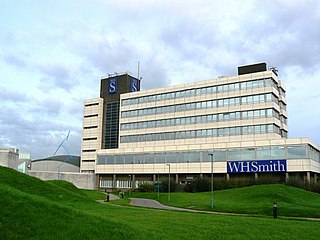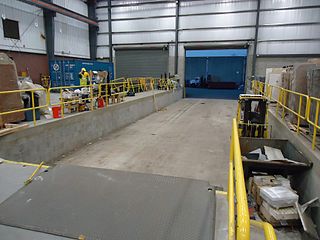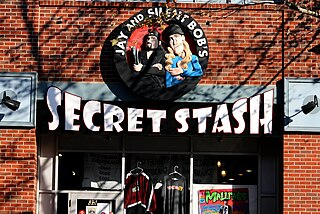
A convenience store, bodega, convenience shop, corner store or corner shop is a small retail store that stocks a range of everyday items such as tea, coffee, groceries, fruits, vegetables, snacks, confectionery, soft drinks, ice creams, tobacco products, lottery tickets, over-the-counter drugs, toiletries, newspapers and magazines.

A supermarket is a self-service shop offering a wide variety of food, beverages and household products, organized into sections. This kind of store is larger and has a wider selection than earlier grocery stores, but is smaller and more limited in the range of merchandise than a hypermarket or big-box market. In everyday United States usage, however, "grocery store" is often used to mean "supermarket".

WH Smith PLC, trading as WHSmith, is a British retailer, with headquarters in Swindon, England, which operates a chain of high street, railway station, airport, port, hospital and motorway service station shops selling books, stationery, magazines, newspapers, entertainment products and confectionery.

A grocery store (AE), grocery shop (BE) or simply grocery is a foodservice retail store that primarily retails a general range of food products, which may be fresh or packaged. In everyday U.S. usage, however, "grocery store" is a synonym for supermarket, and is not used to refer to other types of stores that sell groceries. In the UK, shops that sell food are distinguished as grocers or grocery shops.

A department store is a retail establishment offering a wide range of consumer goods in different areas of the store, each area ("department") specializing in a product category. In modern major cities, the department store made a dramatic appearance in the middle of the 19th century, and permanently reshaped shopping habits, and the definition of service and luxury. Similar developments were under way in London, in Paris and in New York City (Stewart's).

A warehouse is a building for storing goods. Warehouses are used by manufacturers, importers, exporters, wholesalers, transport businesses, customs, etc. They are usually large plain buildings in industrial parks on the outskirts of cities, towns, or villages.

A general merchant store is a rural or small-town store that carries a general line of merchandise. It carries a broad selection of merchandise, sometimes in a small space, where people from the town and surrounding rural areas come to purchase all their general goods. The store carries routine stock and obtains special orders from warehouses. It differs from a convenience store or corner shop in that it will be the main shop for the community rather than a convenient supplement.

Online shopping is a form of electronic commerce which allows consumers to directly buy goods or services from a seller over the Internet using a web browser or a mobile app. Consumers find a product of interest by visiting the website of the retailer directly or by searching among alternative vendors using a shopping search engine, which displays the same product's availability and pricing at different e-retailers. As of 2020, customers can shop online using a range of different computers and devices, including desktop computers, laptops, tablet computers and smartphones.

Retail loss prevention is a set of practices employed by retail companies to preserve profit. Loss prevention is mainly found within the retail sector but also can be found within other business environments.

A car dealership, or car dealer, is a business that sells new or used cars, at the retail level, based on a dealership contract with an automaker or its sales subsidiary. Car dealerships also often sell spare parts and automotive maintenance services.
Consignment is a process whereby a person gives permission to another party to take care of their property and retains full ownership of the property until the item is sold to the final buyer. It is generally done during auctions, shipping, goods transfer, or putting something up for sale in a consignment store. The owner of the goods pays the third-party a portion of the sale for facilitating the sale. Consignors maintain the rights to their property until the item is sold or abandoned. Many consignment shops and online consignment platforms have a set time limit at which an item's availability for sale expires. Within the time of contract, reductions of the price are common to promote the sale of the item, but vary by the type of item sold.
The United Kingdom is home to a widespread and diverse co-operative movement, with over 7,000 registered co-operatives owned by 17 million individual members and which contribute £34bn a year to the British economy. Modern co-operation started with the Rochdale Pioneers' shop in the northern English town of Rochdale in 1844, though the history of co-operation in Britain can be traced back to before 1800. The British co-operative movement is most commonly associated with The Co-operative brand which has been adopted by several large consumers' co-operative societies; however, there are many thousands of registered co-operative businesses operating in the UK. Alongside these consumers' co-operatives, there exist many prominent agricultural co-operatives (621), co-operative housing providers (619), health and social care cooperatives (111), cooperative schools (834), retail co-operatives, co-operatively run community energy projects, football supporters' trusts, credit unions, and worker-owned businesses.

The direct market is the dominant distribution and retail network for American comic books. The concept of the direct market was created in the 1970s by Phil Seuling. The network currently consists of:

A tobacconist, also called a tobacco shop, a tobacconist's shop or a smoke shop, is a retail business that sells tobacco products in various forms and the related accoutrements, such as pipes, lighters, matches, pipe cleaners, and pipe tampers. More specialized retailers might sell ashtrays, humidification devices, hygrometers, humidors, cigar cutters, and more. Books and magazines, especially ones related to tobacco are commonly offered. Items irrelevant to tobacco such as puzzles, games, figurines, hip flasks, walking sticks, and confectionery are sometimes sold.

In a supply chain, a vendor, supplier, provider or a seller, is an enterprise that contributes goods or services. Generally, a supply chain vendor manufactures inventory/stock items and sells them to the next link in the chain. Today, these terms refer to a supplier of any goods or service.

Elderly Instruments is a musical instrument retailer in Lansing, Michigan, United States, with a reputation as a "megastore", a repair shop and a locus for folk music including bluegrass and "twang". Specializing in fretted instruments, including acoustic and electric guitars, banjos, mandolins, and ukuleles, Elderly maintains a selection of odd or rare instruments. Elderly is known as a premier repair shop for fretted instruments, as one of the larger vintage instrument dealers in the United States, and as a major dealer of Martin guitars in particular.

Kirkcaldie & Stains was a department store in Wellington, New Zealand. It was established in 1863 by John Kirkcaldie and Robert Stains with a capital of £700. The first store was opened on Lambton Quay. In 1868 Kirkcaldie & Stains moved to their final location at the corner of Lambton Quay and Brandon Street, expanding several times. There was a branch on Cuba Street, Wellington from 1870 –1876 and one in Napier from 1897 until 1917. French luxury skincare brand Sisley was exclusive to the store in New Zealand.
Retail leakage occurs when local people spend a larger amount of money on goods than local businesses report in sales, usually due to people traveling to a neighboring town to buy goods. Retail sales leakage occurs when there is unsatisfied demand within the trading area and that the locality should provide extra stores spaces for such type of businesses. After all, retail leakage does not necessarily translate into opportunity. For instance, there could be tough competition in a nearby locality that leads the market for same type of product. Many small - to medium-sized communities experience leakage of retail expenditures as local citizens drive to neighboring towns to shop at national retail chains or eat at national restaurant chains. Attracting such national retail chain stores and restaurants to a community can prevent this type of expenditure leakage and create local jobs.
Virgin Megastores was a retail chain that operated in the United Kingdom from 1971 to 2007. The company was established by Richard Branson, originally as a small record shop, and became a national chain. In 2007, the company was sold to management, and was rebranded as Zavvi. Zavvi entered administration in 2008 and subsequently closed.
The retail format influences the consumer's store choice and addresses the consumer's expectations. At its most basic level, a retail format is a simple marketplace, that is; a location where goods and services are exchanged. In some parts of the world, the retail sector is still dominated by small family-run stores, but large retail chains are increasingly dominating the sector, because they can exert considerable buying power and pass on the savings in the form of lower prices. Many of these large retail chains also produce their own private labels which compete alongside manufacturer brands. Considerable consolidation of retail stores has changed the retail landscape, transferring power away from wholesalers and into the hands of the large retail chains.















